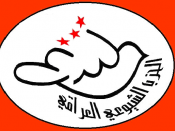Introduction
British imperialism in Iraq can help to explain why Iraq has had so much discrepancy between the working classes and the elites in Iraq. Although imperialism in Iraq really started in the Ottoman Empire around 1850, the bulk of significant levels of imperialism did not begin until the 20th century. Furthermore, even though Britain was only officially in Iraq from 1918 to 1932, Britain determined much of Iraq's policy until 1958 when the Iraqi Communist party gained power in Iraq. Labor in Iraq reacted very strongly to changing circumstances in the 19th and 20th centuries and helped to shape many of the policies of Iraq after independence. The paper highlights the fact that Iraqi resistance did exist in several forms, with the formation of the Iraqi Communist Party and worker protests. However, British economic systems had long-term ramifications well beyond their departure in 1932 that perpetuated and worsened relations between the classes and ethnicities.
Development theory and British policies in Iraq contributed to a worsening of relations with regards to class relations, worker-employer relations, and ethnic relations.
The framework of this paper is to deal with the history of Iraq during the British mandate up until 1958, although the crux of the paper is related to British mandate until 1939, the death of King Ghazi. A brief historiography of what would become the nation of Iraq makes up the first part of the paper; this is necessary to give background and to provide credence to the claims this paper makes. The second section describes the labor system and economic factors that prevented Iraqi date and grain workers from seeing much of the profit they made. Finally, there is the theoretical section, which focuses on how development theory played a role in the design of British policy and how the...


